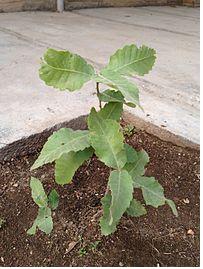Persian Oak (Qquercus brantti) گز علفی
DESCRIPTION
Quercus brantii, the Persian oak, is a species of oak native to Western Asia, including Iran, Iraq, Syria, and Turkey.Quercus brantii (covering more than 50% of the Zagros forest area) is the most important tree species of the Zagros in Iran.Iranians use its seed in traditional medicine. Other useful products derived from oaks include fuel wood, charcoal and timber hardwood.
USES
There is an ever-growing need to develop green, non-toxic, and eco-friendly procedures for synthesis and assembly of nanoparticles with the desired sizes. The hydroalcoholic extract of Persian oak leaves [Quercus brantii Lindl. (Fagaceae)] contains high content of phenolic and flavonoid compounds with strong antioxidant activities, and it seems that this plant can be considered a good candidate for metal nanoparticle synthesis. Objective: The potential of Q. brantii leaves in the production of silver NPs and the effect of the extract ethanol concentration on the produced NPs were studied. Materials and methods: Quercus brantii leaves were freshly collected, air-dried at room temperature, powdered, and sieved. Hydroalcoholic extracts (70% and 96%) were prepared by percolation of the plant powder. The reaction mixtures contained (final concentrations): AgNO3 (1 mM) as the substrate, plant extract as the biocatalyst, and phosphate buffer as the reaction medium. Silver ions were determined using atomic absorption analysis. Particle size distribution of NPs was analyzed using Nano-Zeta Sizer. Samples for TEM were prepared by drop-coating the silver nanoparticle suspensions onto carbon-coated copper grids. Results: Hydroalcoholic extract (96%) of Q. brantii successfully produced quite small (as small as 0.83 nm and the mean size of 6 nm), spherical, and poly-dispersed NPs with low aggregates. The conversion was completed in 5 h. Discussion and conclusion: This plant and the extraction method seem to be quiet attractive for industrial scale production of NPs.
MEDICINAL USES
Persian oak (Quercus brantii Lindl.) belongs the family Fagaceae, is a medicinal plant which seed flour is used to treat inflammatory by the tribes in south western Iran. The current study was done to evaluate the effect of hydro-alcoholic extract of Q. brantii seed flour for treatment of gastric ulcers induced by ethanol in Wistar rats. The hydro-alcoholic extract of Q. brantii was tested orally at doses of 250, 500, and 1000 mg/Kg, control group and standard drug (omperazole) on experimentally gastric ulceration. At the 3, 6, 9, and 14th days, ulcer index in mm2 and histopathological findings were evaluated. Results indicated the size of ulcers significantly reduced at 9, and 14 days after of Q. brantii extract treatment. Curative effect in the hydro-alcoholic induced gastric damage was 100% at 1000 mg/Kg and omeprazole, 99.8 % at 500 mg/Kg, and 95.4% at 250 mg/Kg after 14 days. Results of histopathological investigation showed the thickness of ulcerated mucosa was identical to the normal mucosa with 1000 mg/Kg of Q. brantii hydro-alcoholic extract after 14 days but in the groups treated by 250, and 500 mg/Kg, superficial erosions were visible in the central portion of the healed ulcers. In conclusion, the hydro-alcoholic extract of Q. brantii had active components that accelerates ulcer healing and thus supported its traditional use.

